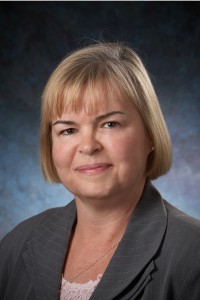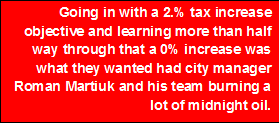By Pepper Parr
 BURLINGTON, ON April 5, 2011 – After sitting on a padded bench for three days, two of them back to back, Acting General Manager Finance Joan Ford’s comment that “it is that simple” when explaining how the city puts its budget together doesn’t seem to have the – ‘oh, I get it’ sense to it.
BURLINGTON, ON April 5, 2011 – After sitting on a padded bench for three days, two of them back to back, Acting General Manager Finance Joan Ford’s comment that “it is that simple” when explaining how the city puts its budget together doesn’t seem to have the – ‘oh, I get it’ sense to it.
But, if you step back from the long, tiring, sometimes inane, sometimes funny sessions – it is quite simple. At least putting the budget together is simple – passing it and figuring out what goes and what stays – I don’t think even Ms Ford would say – “it’s that simple”.
Basically it works like this. There is a budget cycle, which for Burlington is ten months in duration and staff can look for that to change as they head into the 2012 budget cycle. Council is going to want this process squeezed down to five or six months – and with the same staffing compliment as well.

There was no “acting when Joan Ford took to the budget stage – nothing but consistently good delivery.
Each department gets its forms on-line and is asked to enter their data and back it goes to the finance office where all the numbers are pulled together. Frequently Ms Ford will ask a department to take another look at a number they’ve submitted and there is discussion around who is more right.
When Finance has all its numbers in, an analysis is done and it gets sent to the members of the Executive Budget Committee, which is the next level up and where the really sharp axes come out. That eight member committee is led by City Manager Roman Martiuk, and consists of the General Managers: Kim Phillips of Budget and Corporate Services and Scott Stewart of Community Services and Joan Ford of Finance. Add to that the Executive Directors: Allan Magi, Steve Zorbas and then stir in the Director of Human Resources Roy Male and a rotating Director, which this year is Clerk Angela Morgan, and you have the team that works with the guidance given it by city council to create a budget that manages the revenue needed to meet the expenses it takes to keep the city running.
Martiuk who chairs the EBC explains that they never vote but “we do work towards consensus and give every member of the team an opportunity to voice their opinions.”
“I seldom make rulings but I have had a situation, not with this city, where I was advised to tell council they were wrong. I ruled that council was never wrong and that ended that discussion”.
Martiuk explained that he discusses matters with council members on an ongoing basis and has all but immediate access to the mayor – both are on the same floor of city hall. Getting a budget position this year was complicated by a number of matters explains Martiuk. First our initial instructions were to come back with a budget that was in the 2.5% to 3.5% range – that  was given to us by an out going council. Everyone thought that was a really big step forward at the time – the city had experienced 4% to 5% increases for the previous four years – so 2.5% looked really positive
was given to us by an out going council. Everyone thought that was a really big step forward at the time – the city had experienced 4% to 5% increases for the previous four years – so 2.5% looked really positive
“We worked up our numbers within those parameters”, explains Martiuk.. “Normally”, he adds, “we go back to council with a draft but that doesn’t happen during an election year “so we were left to work on our own, which we did.”
To add to the complexity was that a number of matters were producing very favourable results for the city over which staff had no control. The gas tax was going to be very good, the income from investments was also very good. Low snow removal costs in 2010 were a big help. “Normally”, said Martiuk, “there is good news and there is bad new but during the last half of 2010 it was basically all good news and we were working within a cost containment model which meant money was coming in a at better clip than usual and we were spending less.”
Martiuk agreed that the 2010 $9.3 million surplus is probably the biggest the city has ever experienced. We are not likely to see that situation again. Each department knows its financial position at the end of each month with an aggregate number available at the end of each quarter.
 There was quite a bit of tension between staff and council members as they waded into the development of the budget. Much of that tension was the result of some rather startling comments made by first time council member Paul Sharman who brought a very brusque and direct style to his question of staff. His directness brought out the fiscal concerns that councillors Taylor and Dennison had been harbouring for years. With Sharman leading then there was a new tone to this council. It was sharper, more focused and tougher in its position of city hall staffing and payroll. Have the fattest surplus on record certainly helped but this council seems to have more political sensitivity and it is always aware that it hurts when it gets caught out.
There was quite a bit of tension between staff and council members as they waded into the development of the budget. Much of that tension was the result of some rather startling comments made by first time council member Paul Sharman who brought a very brusque and direct style to his question of staff. His directness brought out the fiscal concerns that councillors Taylor and Dennison had been harbouring for years. With Sharman leading then there was a new tone to this council. It was sharper, more focused and tougher in its position of city hall staffing and payroll. Have the fattest surplus on record certainly helped but this council seems to have more political sensitivity and it is always aware that it hurts when it gets caught out.
Once council votes on the budget and formally approves the tax levy for 2011 the EBC will meet to review how budget setting for 2011 went and then report to Council on any changes in the budget making procedure that should be made. Even before those changes get discussed and then put into place Joan Ford will be generating the documents that will report budget numbers for each department and Board every month as she tracks expenditures against revenue and looks for any variances that reveal a problem.
Ms Ford has to deal not only with the city departments but the Boards and Commissions as well. These include the Library Board, which this year had some really serious problems to contend with, the Burlington Performing Arts Centre which is going to draw down close to half a million every year for a number of years and will probably always need a transfusion line stuck into one of their veins.
The Tourism people, the Economic Development Corporation as well as the Burlington Art Centre need and get funds from the city. Some of them also have revenue sources of their own but all are seen as “members of the family” and they need their allowances.
The hospital is going to undergo a very substantial upgrade at some point in the not too distant future. The city is preparing for this by setting aside $1.2 million each year.
Every time you see that $ sign – make the sound – “kaching” – because money is going in or coming out of the budget that keeps the water running and the snow off the sidewalks.
 Ford, a Milton resident, has been with the city for much of her career and is currently the Acting Executive Director, Finance. She manages a team of people who have a really solid grip on what gets spent within every department and can spot changes the moment they appear. The Finance office is the first line of defense when it comes to cost constraint. There isn’t any of that “spend your budget or you lose it” within this finance department. Managers appear to have to justify every nickel with Ms Ford before she takes the numbers to the Executive Budget Committee where she has to defend them.
Ford, a Milton resident, has been with the city for much of her career and is currently the Acting Executive Director, Finance. She manages a team of people who have a really solid grip on what gets spent within every department and can spot changes the moment they appear. The Finance office is the first line of defense when it comes to cost constraint. There isn’t any of that “spend your budget or you lose it” within this finance department. Managers appear to have to justify every nickel with Ms Ford before she takes the numbers to the Executive Budget Committee where she has to defend them.
That’s the spending side of the Budget – there is also the revenue side.
First there are the taxes levied, then there is income from development charges which are shrinking because Burlington is approaching the “built out” stage of its development.
There is the gas tax that puts close to $5 million in the coffers. Then there is investment income – we earned $1.5 million on that last year. And of course that $3 million chunk of change that was the result of the “gapping” with our human resources that produced the much of the surplus that solved a lot of problems. That surplus was a gift to a council in its first year in office – they won’t have anything like that to work with next year.
All the back and forth with the numbers was done under the firm control of Joan Ford and her crew who work out of the Simms building across the street from city hall.
When the council budget committee is in session Ms Ford and a number of her trusty aids are in the chamber with her – each has a thick loose leaf binder and all kinds of briefing documents with them for reference. When a council member has a question one of the assistants or Ms Ford will pop out the answer – and they always have the answer in less than three seconds.
On the final day of budget deliberations at the committee level there is a computer in the chamber hooked up the computer that holds all the numbers – as a decision is made to approve an item it gets keyed in and the operator can tell council where they are in terms of balancing their budget.
The last items is always for an amount that rounds everything off. When that number is entered Ms Ford leans back, flashes a smile that is a large part smug and says – it’s really that simple.
We wish.
[retweet]














